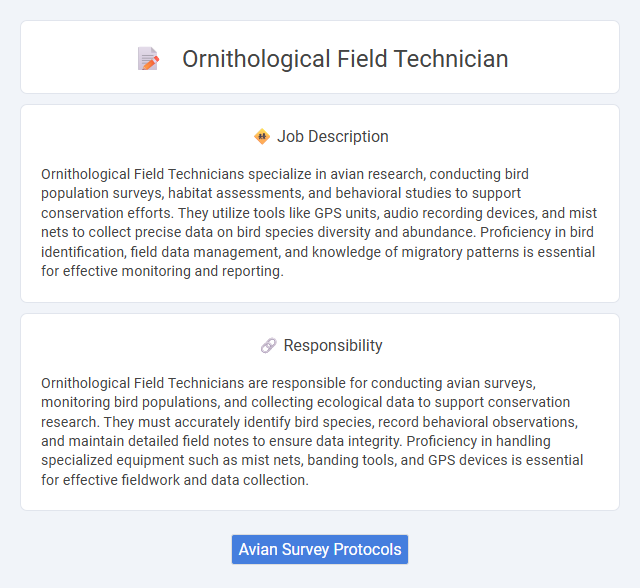
Ornithological Field Technicians specialize in avian research, conducting bird population surveys, habitat assessments, and behavioral studies to support conservation efforts. They utilize tools like GPS units, audio recording devices, and mist nets to collect precise data on bird species diversity and abundance. Proficiency in bird identification, field data management, and knowledge of migratory patterns is essential for effective monitoring and reporting.
Individuals with a passion for wildlife and strong observational skills are likely well-suited for an Ornithological Field Technician role, as the job demands extensive outdoor activity and data collection in varying weather conditions. Those with physical stamina and adaptability may better handle the physical demands and unpredictable environments encountered during fieldwork. Candidates who prefer structured indoor settings or have difficulty with prolonged outdoor exposure might find this position less suitable.
Qualification
Ornithological Field Technicians require strong skills in bird identification, data collection, and habitat monitoring, often needing a degree in biology, ecology, or related fields. Proficiency in using GPS devices, binoculars, and audio recording equipment is essential for effective fieldwork. Prior experience in conducting avian surveys, handling permits, and working in diverse environmental conditions enhances qualification for this role.
Responsibility
Ornithological Field Technicians are responsible for conducting avian surveys, monitoring bird populations, and collecting ecological data to support conservation research. They must accurately identify bird species, record behavioral observations, and maintain detailed field notes to ensure data integrity. Proficiency in handling specialized equipment such as mist nets, banding tools, and GPS devices is essential for effective fieldwork and data collection.
Benefit
Ornithological Field Technician positions likely offer valuable hands-on experience in bird monitoring and research, enhancing skills in data collection and species identification. This role probably provides opportunities for outdoor work in diverse habitats, contributing to conservation efforts and ecological understanding. Benefits may include networking with wildlife professionals and potential pathways to advanced careers in ornithology or environmental science.
Challenge
The Ornithological Field Technician job likely involves challenges related to working in diverse and sometimes harsh outdoor environments, requiring adaptability and resilience. Field data collection may prove demanding due to variable weather conditions, difficult terrain, and the need for precise observation skills. There is a probability that technicians will need to troubleshoot equipment and navigate logistical uncertainties while maintaining strict scientific standards.
Career Advancement
Ornithological Field Technicians gain practical experience in bird monitoring, data collection, and habitat assessment, laying a strong foundation for careers in wildlife biology and conservation science. Mastery of GIS technology, bird identification, and statistical analysis enhances prospects for roles such as Research Biologist, Conservation Manager, or Environmental Consultant. Networking through field projects and publishing findings can accelerate advancement in academia or specialized consultancy positions within ornithology and environmental sectors.
Key Terms
Avian Survey Protocols
Ornithological Field Technicians specialize in implementing standardized avian survey protocols, including point counts, transect walks, and mist-netting, to monitor bird populations and their habitats. Proficiency in species identification, behavior observation, and data recording ensures accurate assessment of avian diversity and abundance for conservation studies. Mastery of ecological data analysis software enhances the interpretation of survey results, supporting effective wildlife management and habitat restoration efforts.
 kuljobs.com
kuljobs.com